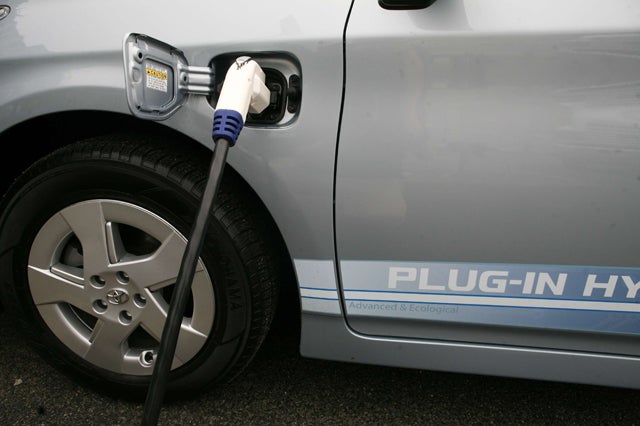Charged with Theft for Charging His Electric Car—with Five Cents’ Worth of Electricity
Evan Bernick /
A nickel might not have much purchasing power these days, but, in Chamblee, Georgia, charging your Nissan Leaf with five cents’ worth of electricity can land you in jail.
After driving to Chamblee Middle School, where his 11-year-old son was playing tennis, Kaveh Kamooneh took the opportunity to charge his vehicle at one of the school’s exterior outlets. He claims that he charged his battery for 20 minutes—enough for an estimated five cents’ worth of electricity. But then he was spotted by a police officer, who gravely informed him that he was committing a crime. “He said that he was going to charge me with theft by taking because I was taking power, electricity from the school,” Kamooneh said.
Kamooneh wasn’t arrested on the spot. Instead, the officer filed a police report. Eleven days passed before deputies knocked on Kamooneh’s door with a warrant for his arrest. Kamooneh spent 15 hours in jail. It remains to be seen whether he’ll be prosecuted for theft.
Under Georgia law, Kamooneh may well have committed a crime. O.C.G.A.16-8-5 (2010) 16-8-5 provides: “A person commits the offense of theft of services when by deception and with the intent to avoid payment he knowingly obtains services, accommodations, entertainment, or the use of personal property which is available only for compensation.” In Georgia v. Jackson (2009), the Georgia Court of Appeals stated: “The surreptitious and unauthorized use of electricity or electrical energy is one of the forms of obtaining services within the meaning of statute criminalizing theft of services.” As Chamblee police Sergeant Ernesto Ford sees it, the matter is simple: “[Kamooneh] broke the law. He stole something that wasn’t his.”
Simple, yes. But also simple-minded. Being arrested is a humiliating, terrifying experience. Ordinarily, the police handcuff an arrestee, place him in the back of a squad care for the ride to the police station, where the unlucky party is fingerprinted, booked, and possibly even strip searched.
A criminal conviction compounds the humiliation and can ruin someone’s life. The criminal law should not be used to target every lapse but should be reserved for cases of truly outrageous conduct.
Kaveh may have taken something that wasn’t his. But, as in the case of Crissy Brown, a young woman who was locked up over one unpaid parking ticket, that doesn’t justify the treatment he received. A civil fine would have been more than sufficient to penalize him. Not only should he not be prosecuted—he never should have been arrested.
It certainly would have saved taxpayers more than a nickel.

